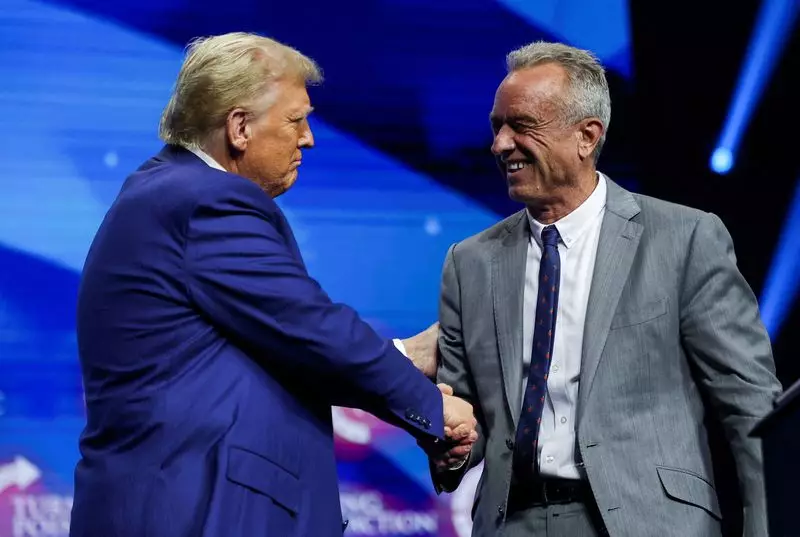In the landscape of modern medicine and public health, the subject of vaccine safety continues to instigate heated debate. One figure who has prominently emerged in this discourse is Robert F. Kennedy Jr., a well-known environmental lawyer and activist. His involvement with mass litigation against the pharmaceutical giant Merck over its Gardasil vaccine raises crucial questions about the implications of such legal actions on public perception and health policy moving forward.
Robert F. Kennedy Jr.’s engagement with the Gardasil lawsuits began in earnest in 2018, when he collaborated with attorney Robert Krakow, a specialist in vaccine injury claims. This partnership aimed to challenge the credibility of the HPV vaccine, which has been promoted for the prevention of certain cancers linked to the human papillomavirus (HPV). According to legal experts, Kennedy’s advocacy went beyond merely questioning vaccine safety; he actively sought to consolidate legal efforts against Merck, believing that there was sufficient evidence to argue that the company misrepresented the vaccine’s safety and efficacy while downplaying its side effects.
Krakow identified grounds for a direct lawsuit against Merck rather than pursuing claims through the federally sanctioned vaccine court, which is typically seen as the initial pathway for vaccine-related injury claims. The special vaccine court is designed to ensure quick resolution of claims but has its limitations, such as capping compensation and restricting the liability of manufacturers. These factors deterred many lawyers from seeking claims outside this system, as the potential for significant payouts from traditional tort claims appeared more lucrative but daunting.
Kennedy’s involvement in recruiting a network of lawyers to take on Merck was pivotal. His presence undoubtedly raised awareness among a cohort of attorneys unfamiliar with the possibilities of litigation outside the conventional mechanisms set by the federal vaccine court. This shift is indicative of the broader trend in which high-profile individuals can rally support for a cause that might otherwise remain obscure.
For attorney Michael Baum, who had previously collaborated with Kennedy on other high-stakes lawsuits, the prospect of pursuing Gardasil cases was initially out of reach. Baum credits Kennedy for enlightening him and others about the potential of direct legal action against vaccine manufacturers. By galvanizing his legal peers, Kennedy amplified their capacity to confront a formidable industry that often remains insulated from significant litigation due to specialized protections.
As the litigation progresses toward its first trial, scheduled for January 21, 2024, questions about Kennedy’s dual role as a litigator and a potential U.S. Health and Human Services Secretary arise. How his administrative decisions could intersect with ongoing litigations amplifies concerns about the politics of public health. Should he secure the position of HHS Secretary, Kennedy would possess significant authority over vaccine policy and the capacity to influence the court’s role in adjudicating vaccine-related claims.
This potential shift in governance could significantly reshape the landscape. Legal experts speculate that Kennedy’s influence might prompt a reevaluation of how vaccines are treated legally, potentially impacting both vaccine development economics and accessibility of redress for individuals claiming vaccine-related injuries. Moreover, the question of removing individual vaccines from the vaccine court system looms large, as advocates like Krakow express concerns that such actions could undermine protections for injured parties who may not have the resources to launch extensive legal battles against pharmaceutical giants.
As nearly 160 million doses of Gardasil have been administered since its launch, public health authorities, including the CDC, continue to advocate for the vaccine as a critical component of cancer prevention strategies. Merck has firmly defended the safety and efficacy of Gardasil, citing a robust body of scientific evidence amassed over decades. However, the opposite perspective—that of vaccine hesitancy and skepticism—continues to thrive, fueled in part by legal actions reminiscent of the Gardasil litigation.
This complexity highlights the fragile balance public health officials must navigate when addressing competing narratives about vaccine safety. As such, Kennedy’s activities serve to exemplify how litigation can become a battleground for broader ideological conflicts surrounding health and pharmaceuticals, often impacting public trust in governmental health mandates and policies.
The intersection of Robert F. Kennedy Jr.’s legal initiatives against Merck and the broader public health narrative underscores a contentious and evolving dialogue about vaccines in America. As the Gardasil trial approaches, its outcomes may not only influence the future of vaccine litigation but also the landscape of vaccine acceptance and public health policy as a whole. The challenges posed by competing narratives illustrate the need for ongoing scrutiny of both the scientific and legal dimensions of vaccines, as they continue to play an essential role in protecting community health.

